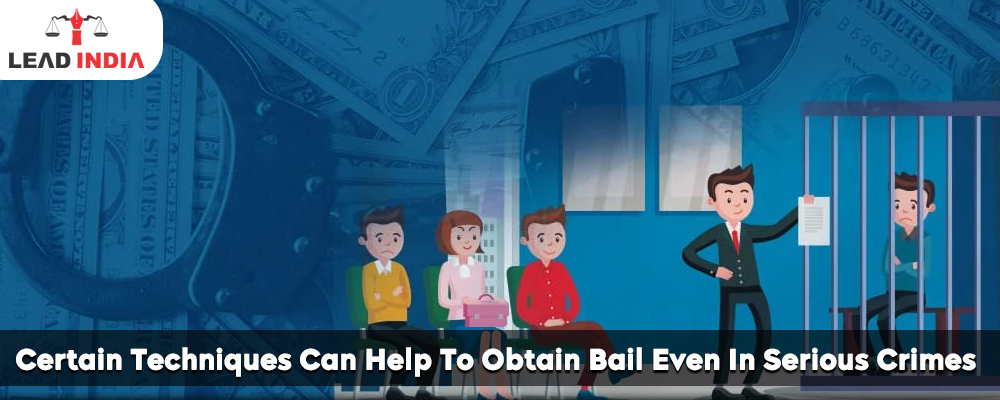Bail is a very important concept in criminal justice systems. It is a fundamental aspect in which someone is accused of a serious crime, securing bail by certain techniques and strategies. For the lawyers and accused individuals, securing bail can be a difficult task but not impossible. There are some provisions in laws which help to grant bail. There is a deep understanding of the law, the court’s discretion, and the various factors that influence bail decisions. In this article, we will explore the tools and techniques to secure bail even in serious offences by applying the right approach and strategy.
What Is Bail?
Bail is a temporary release of a person who is in custody. It is provided on condition that they will appear in court at a later date when required. It is a way to ensure that a person will be available for the trial or court hearing.
When someone is arrested and charged with a crime, they may obtain bail. If bail is granted, the person is released on bond. Bail is defined in section 2 (b) of THE BHARATIYA NAGARIK SURAKSHA SANHITA, 2023.
Need A Legal Advice
The internet is not a lawyer and neither are you. Talk to a real lawyer about your legal issue

Condition Of Bail
- The accused must appear in court when scheduled.
- The accused should not temper the evidence.
- The accused person provides a security bond.
- There should be no contact with the co-accused.
- The accused person must not abscond the jurisdiction of the court without permission.
Types Of Bail
1. Regular Bail: It is one of the common types of bail, where the accused is released from custody on a certain amount of money.
2. Anticipatory Bail: It is grant to the person before being arrest for a non-bailable offence. It is grant by a sessions court or a High court.
3. Interim Bail: This type of bail is grant for a short period of time. Usually for the next hearing or until the investigation is complete.
5. Conditional Bail: In this bail, the accuse is release on certain conditions.
6. Unconditional Bail: In this bail, there is no condition impose on the accuse.
7. Session Bail: This bail is grant by a session court in a serious offence.
8. Default Bail: This bail is grant in that condition when police fail to file a charge sheet within time.
Provision Of Bail:
IN THE BHARATIYA NAGARIK SURAKSHA SANHITA, 2023
SECTION 478: This section provides in what cases bail is to be taken.
SECTION 480: When bail may be taken in case of a non-bailable offence.
IN BAIL RULES, 1972:The Bail Rules are a set of rules that provide guidance on the procedure for granting bail.
IN THE NARCOTIC DRUGS AND PSYCHOTROPIC SUBSTANCE ACT, 1985: This Act provides the provision of granting bail in this Act.
IN THE PREVENTION OF MONEY LAUNDERING ACT, 2002: This act provides the provision of bail in money laundering cases.
THE UNLAWFUL ACTIVITIES (PREVENTION) ACT, 1967: This Act provides the bail provision related to terrorism and other unlawful activities.
The Provision Of Bail In Constitution Of India
- ARTICLE 21 protects life and personal liberty, this article ensures that no person can be detain or arrested without a valid reason and arrest must be according to the procedure established by law.
- ARTICLE 22 protects against arrest and detention in certain cases. According to this article:
(a) Protection against arbitrary arrest and detention
(b) Ensures informed arrest and detention
(c) Guarantees the right to consult a lawyer and be produce before a magistrate within 24 hours.
Techniques For Getting Bail In India:
There are two types of cases:
- General Cases
- Serious Cases / Specific Cases
There are some situations in which bail may be grant in serious offences:
- Lack of evidence.
- Doubtful prosecution case
- Age or infirmity
- Special circumstances (family emergency or serious personal crises).
- Murder cases (section 103 of Bharatiya Nyaya Sanhita,2023)
- Rape cases (section 63 of Bharatiya Nyaya Sanhita,2023)
- Terrorism
- Economic offence
- If the accused has good behavior.
- Serious illness or medical condition of the accused.
Leading Case:
ARNESH KUMAR VS. STATE OF BIHAR & ANOTHER AIR 2014
In this case, the Supreme Court held that the police should not arrest without reasonable grounds. The police should properly investigate first and make sure the person is not running away or destroying evidence.
The Supreme Court Gives Some Guidelines On Bail
- Bail is the rule, jail is an exception
- Bail should be grant when the accused first time presents in the hearing.
- There should be reasonable conditions for bail.
Conclusion
In the Indian legal system, bail is a procedural right that allows an accused person to be release from custody on some conditions. There is one of the famous statements” BAIL IS A RULE, NOT EVIDENCE”.
So granting bail even in serious offences is a thoughtful approach that balances the need for safety with the protection of individual liberty. There are many provisions in laws which provide bail even in serious crimes.
The tools and techniques used to obtain bail need deep study and understanding. In the end, we can say that bail is a procedure which is provided in law. But there are certain points on which the court grants bail, it is not a mandatory provision it depends upon each fact and circumstances of the case.
One can talk to lawyers from Lead India for any kind of legal support. In India, free legal advice online can be obtain at Lead India. Along with receiving free legal advice online, one can also ask questions to the experts online free through Lead India.





 Talk to a Lawyer
Talk to a Lawyer